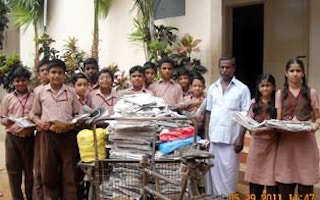Inspired by India’s rag-pickers, an non-governmental organisation in the Indian city of Chennai (formerly Madras), Paperman, creates awareness about recycling and runs campaigns to fund social causes, says Pia Chandavarkar.
The bell indicates the end of another day at the Church Park School in the southern city of Chennai. The students stream out of the classrooms, eager to get home.
On their way out, they each drop something into a large carton at the classroom door. Over just a few weeks, the carton has almost filled with old newspapers and plastic.
“We will sell these to our local rag-picker, and donate the money to an old-age home. Last month, we raised enough to send one girl to school for a year,” says a student volunteer at the school.
The Church Park School is one of 120 schools in Chennai which are planning to start a “recycling revolution” which they hope will spread across India, says 23-year-old Mathew Jose, who began Paperman.
In early 2010, Mathew was looking for work after graduating when he received a routine visit at home from a local “raddi-wallah” or rag-picker.
For years, rag-pickers or scrap dealers have been a familiar sight in Indian towns and cities, going door-to-door and collecting all kinds of household waste - from newspapers to plastic and glass bottles.
The scrap dealers pay a certain amount to each household depending on how much they collect. This is then sold at a higher price to bigger dealers, who send it to recycling centres.
“These men come to your doorstep and find value in things we throw away. This is a wonderful system, because it works on economics,” says Mathew.
“I had worked in solid waste management for a year with a local NGO. It has become fashionable to talk about ‘going green’, but I realised that real change actually begins with this simple rag-picker,” he says.
‘Simple concept’
But despite having an established system of recycling, Mathew found that recycling as a concept was not as widespread as it should have been.
“Out of roughly 36.5 million tonnes of waste generated in India per year, only 20 per cent is recycled, while the rest ends up in landfills,” says Mathew.
And thus was born the idea of Paperman, a tribute to the rag-pickers in India.
Paperman was launched as a small venture with the support of a few friends and well-wishers.
“It was a simple concept that I wanted to spread, just common sense that people forgot,” says Mathew.
Accompanied by friends, Mathew started visiting schools and residential societies to create awareness about recycling.
Frequent drives
Through simple campaigns like Recycle Week and Sell Waste, Buy Smiles, Mathew began encouraging people to form recycling communities and organise programmes in schools or apartment buildings.
Mathew and his volunteers frequently conduct drives to introduce residents to the rag-pickers in their neighbourhood. Recently, they started maintaining an online database of rag-pickers and scrap dealers across Chennai.
Such initiatives help the mostly unorganised sector of rag-pickers to strengthen their networks, says Kishan Murthy, who runs a small waste dealership in Chennai.
“My father was a rag-picker, and my family has been in the business for over 50 years. We have established customers, but it is always hard to find new ones,” he says.
As the movement caught on, Mathew realised that recycling had greater fund-raising potential, too.
“I thought that if this money could be used to support a social cause, more people would get involved, because it would also appeal to their social consciousness,” he says.
Two causes in one
Last year, Paperman collaborated with the organisations Nanhi Kalli and KC Mahindra to raise funds for education for girls.
“From July 2010, we managed to raise enough to fund a year of school education for 100 girls across India,” says Mathew.
Besides education for girls, Paperman also encourages citizens to donate to other causes or charities they find important.
From modest beginnings in 2010, Paperman now has the support of various corporate and governmental organisations and has spread its campaigns to 66 cities.
“Ultimately, my goal is that the recycling movement should go beyond Paperman, such that anyone anywhere in the country can take it up at their level,” says Mathew.

















